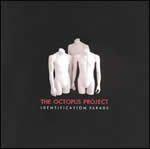|
|
 |
Dusted Reviews
Artist: The Octopus Project Album: Identification Parade Label: Peek-A-Boo Industries Review date: Sep. 2, 2002 |

|
|
|
 |
That Mollusk Can Wail
Time was, rock had clear origins, most of them American: blues, soul, country, bluegrass. Whether you were the Beatles or the Turtles, the Kinks or the Monks, your music had well-known, explicit influences. What you did with these influences was your business, but it was easy enough to see where your music came from. Stadium rock, punk, even no-wave had their roots or the roots of their reactions in these forms, and it seemed as though these origins were impossible to escape. Then came the 1980s. People began using synthesizers and computers, Peter Gabriel thought that "world music" was a good idea, and Kraftwerk put out a few albums. The end result is that skinny white people now make music that falls all over the map, with genres and micro-genres that would elicit a blank stare from Keith Richards.
Whether this is good or bad is a moot point. It's happening, and as computers evolve and sophisticated software becomes even more ubiquitous, we'll see an even greater splintering and refining of musical styles. One result is that many musicians may never even have heard of Robert Johnson, and that a rock band could be just as influenced by Aphex Twin as they are by the Who. A great exemplifier of this shift is the Austin, Texas-based Octopus Project, who have managed to synthesize all manner of influences into a coherent whole on their album, Identification Parade. Various electronic elements, samples, dance beats, atonal guitar explorations, and ambient drones make up the soundscape of this record, on songs that bound around between different genres, often within the same track. It's not rock, and it's not IDM or any other electronic sub-genre. The best way to describe the overall sound of the record is to imagine the three members of OP huddled around their synths and beat-up guitars, trying to decide whether or not they like Fugazi or New Order better, then getting stoned and playing an electronic cover of "Waiting Room".
There is no overarching ethos to the record, and this is all for the better. Percussion ranges from live drums to computer-sequenced trash can lids; there is Sonic Youth-inspired guitar, as well as mournful keyboards and weird analog bleeps. The album doesn't sound experimental as much as it sounds open-minded and dedicated to innovation. Whatever instrument or aesthetic that worked best was used, and this lack of cohesion produces, by album's end, a surprisingly satisfying coherence, despite the stylistic shifts. For however different the instrumentation might be, there is, behind it all, the collective will of the group, and an almost unerring sense of what will engage with the listener. Even the glitchy, sample-filled "Marshall Examines His Carcass" has a recurring keyboard riff that will lodge in your brain, as well as a nasty Casio breakdown at the end. There are no conventional vocals, but you're about three songs in before you even notice. Almost every song is full of hooks, and the band is capable of throwing down beats that would make Le Tigre nervous, especially on tracks like "The Way Things Go", which splits the difference between early R.E.M. and German techno. Closing track "Hypnopaedia" begins with tweaked vocal samples and gradually segues into a long, drawn-out organ drone. The effect is deeply melancholic, producing one of the more affecting songs I've heard in a long time.
The band spent almost three years assembling and recording Identification Parade, and it shows. There are never more elements in a song than are necessary, and the whole thing flows together so well that once it's on it's almost impossible to turn it off. The album also represents, in its own way, a harbinger of things to come, capturing our peculiarly liminal zeitgeist. In the future, we may very well view this era as a great turning point, a time when our expectations of what music should sound like are radically altered. The music on this album expresses perfectly the in-between-ness of our age, with its clattering rock instruments and strange, computerized rhythms. This is not the sound of an indie-rock band trying to freshen up its sound with bits of electronica thrown in. Nor is it self-consciously "eclectic". Rather, it takes for granted the incredible range of influences percolating through music today and makes them its own, producing an endlessly engaging album that reveals more quietly sublime details with every listen.
By Jason Dungan
|







